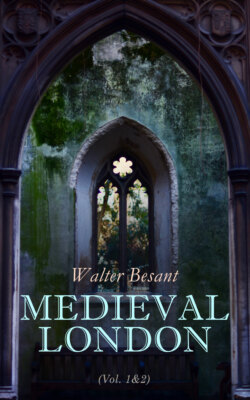Читать книгу Medieval London (Vol. 1&2) - Walter Besant - Страница 13
На сайте Литреса книга снята с продажи.
ОглавлениеJOHN WYCLYF (d. 1384)
From MS. Harl. 4866.
It does not belong to this history to attempt an estimate of the character and the political career of John of Gaunt. Yet it may be mentioned that he was regarded with the deepest jealousy and was suspected of designs upon the Crown; for it was considered it might be easy for him to supplant the young prince Richard. Yet he was undoubtedly the greatest and most powerful noble in the land. Moreover, in matters of religion he took the side of Reform, especially as regards the wealth and power of the higher clergy. In this respect he undoubtedly had with him the general opinion of the City, both of the better sort—Whittington, among others, was reputed to lean in that direction—and of the craftsmen, among whom the Friars and their teaching had great influence. Unfortunately he offended the City beyond all power of forgiveness by proposing to abolish the Mayoralty and to encroach further upon their liberties. And then came the famous trial of Wyclyf in St. Paul’s Cathedral. Wyclyf was summoned to appear at St. Paul’s before the Archbishop of Canterbury and the Bishop of London to answer certain charges as to opinions.
He obeyed, but there came with him his protector, John of Gaunt, and the Earl Marshal, with, one doubts not, a sufficient following to protect their persons. The Cathedral was filled with people drawn together by the desire to see and to hear this fearless champion of Reform. It was with difficulty that the party could work their way through to the place of hearing, which was the Lady Chapel. The Earl Marshal exercised his authority, perhaps loudly, to keep the people back. The Bishop of London, indignant at the exercise of any authority but his own in his own Cathedral, declared that had he known how Lord Percy would act he would have forbidden him admission. The Duke of Lancaster with equal heat assured the Bishop that the Lord Marshal would maintain order, despite him. When they reached the Lady Chapel, the Earl Marshal demanded a seat for Wyclyf. The Bishop refused. Then angry words passed and recriminations; it was rumoured that John of Gaunt threatened to drag the Bishop out of the Church by the hair of his head. The quarrel grew to a tumult; the Court was dissolved; Wyclyf, who had said nothing, withdrew, and the Duke with his party left the Church and rode to the house of one John de Ypres.
There was rancour against the Duke of Lancaster for other reasons, apart from this insult to the Bishop. It was rumoured that he had the design of abolishing the Mayor and of appointing a Custos in his place; and that he held that the Marshal of England should have the right of arresting criminals in London as well as in other parts of the kingdom. The quarrel at St. Paul’s was only the last drop in the cup. That strange wildfire which seizes mobs, beginning one knows not where, and spreading one knows not how, flamed up in the London streets. The mob would have the Duke’s life. He, who was at the house of John de Ypres in the City, and at dinner, was startled by one of his knights who came to warn him. There was no time to be lost; he rose from table and hastening down to the nearest stairs took boat across the river and went to the Palace at Kennington. When the mob found that he was gone they came to his Palace of the Savoy, where they murdered a priest, and would have wrecked the palace but for the intervention of the Bishop of London.
The Mayor and Aldermen obtained an interview with the King and expressed their sorrow at what had happened: they said it was the act of a few lawless men, who should be found and punished, and therewith the Duke seemed satisfied. But the insults of the populace continued; they hung up his shield reversed to show that he was a traitor; they posted libels and insults upon him until he demanded the excommunication of the City. The Bishop of London refused; whereupon the Bishop of Bangor pronounced the excommunication. Had, then, one Bishop the right of excommunicating the people in the diocese of another Bishop? The Mayor, Adam Staple, was removed, and Nicolas Brembre was elected. Certainly it seems as if Adam Staple had shown his own weakness in not maintaining order. Lastly, the City tried to appease the Duke by offering a wax taper bearing his arms in St. Paul’s. Just then the old King died.
